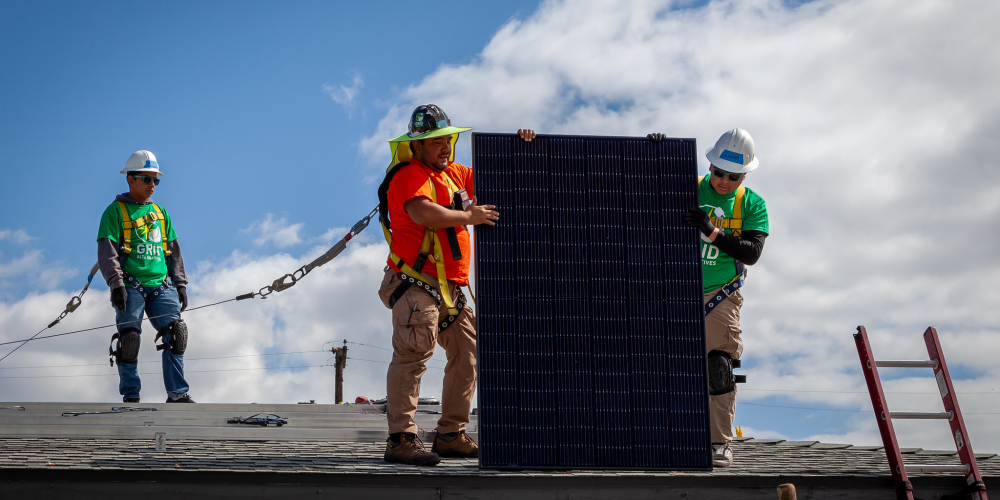Community-driven climate action spurs economic benefits
New reports from UCLA document how state investments in Transformative Climate Communities reap financial wins for households, workers, and the local economy
Francisco Javier Prats (center) teaches high school students to install a solar panel in March 2024. Photo credit: GRID Alternatives
For Carolina Rios, work used to mean the agricultural fields where her immigrant parents labored outside of Stockton, California. An internship changed her life. Rios now works with the organization Rising Sun Center for Opportunity, helping families like hers access home upgrades to save money, energy, and water.
“I’ve learned a lot, like how to be more green and how I can help my community,” said Rios reflecting on her time with Rising Sun, first as an intern and now a project manager. Her climate career has helped her and her family financially. “With the money I’ve earned, we were also able to move from a one-bedroom that five of us shared to a more spacious place,” she added.
Both the internship program and the energy and water-saving projects were funded by a grant from California’s Transformative Climate Communities (TCC) program awarded to Stockton Rising.
New reports from the UCLA Luskin Center for Innovation illustrate how Rios’ experience is just one example of how this state program couples climate action with economic empowerment for members of the most underserved and pollution-burdened communities. The TCC Program funds development and infrastructure projects to achieve major environmental, health, and financial benefits in California’s most disadvantaged communities.
UCLA researchers have tracked progress in five communities that have each received grants from the TCC program: Fresno, Ontario, Stockton, and the Los Angeles neighborhoods of Northeast San Fernando Valley and Watts. Across the communities, some common projects — such as installing solar panels on low-income homes and improved mobility options for getting around without an expensive or polluting car — allow households to help the environment while helping their pocketbooks.
“Financial benefits are going to households, workers, and now the broader economy as more money flows into these communities via investments in no-cost solar panels on homes, training programs for workers, and infrastructure projects that benefit entire communities,” said Samantha Astudillo, project manager and researcher.
The first round of TCC grants is nearing the end of implementation in 2025. The hope is that the progress seeded by TCC can catalyze further transformation. The latest round of UCLA’s reports on TCC investments shows that this catalytic change is already underway. As historic levels of federal climate funding become available through the Inflation Reduction Act, California’s investments in TCC have the potential to unlock additional investments.
“TCC helps communities build capacity for additional investments, by giving them the foundation to create competitive applications for other grant opportunities,” said Matt Read of the California Strategic Growth Council, the agency that administers the TCC program. “It’s estimated that the first round of the TCC program has brought in more than $355,650,500 of matched funds from other sources, including federal grant opportunities like the U.S. Department of Transportation’s RAISE Grant, which nearly tripled TCC investments.”
In addition to what TCC has accomplished in Stockton, examples of economic benefits in other TCC-funded communities include the following:
Saving households money
Advancing careers through workforce development
Supporting small businesses and entrepreneurs
Unlocking other funding and catalyzing economic development
TCC is part of California Climate Investments, a statewide initiative that puts billions of Cap-and-Trade dollars to work reducing greenhouse gas emissions, strengthening the economy, and improving public health and the environment — particularly in disadvantaged communities.
To learn more, see UCLA’s Tracking Groundbreaking Climate Action webpage.








